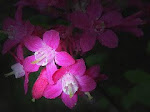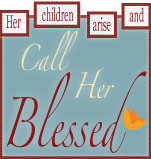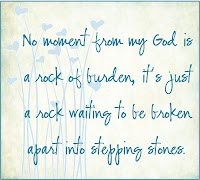Wednesday's Woe
War Between the States:
When Words’ Effect Berates…
The Importance of Not Comparing a
Death of Order (such as Child Losing a Mother),
complicated though that may be, with a
Death Out of Order (Mother Losing a Child)
War Between the States
Your state: Denial—
My state: Under Fire
For still loving my dead child.
Clueless to my pain,
Doing what you do—
I cannot be around you.
Simply loving you—
I reach out to care,
But you stab me with a spear!
Blind to Child-Loss pain:
My heart you disdain—
(Its vulner’bility scares…)
Then words start to fly:
War declared ‘tween you and me
Slaughtering my heart…
Love must rear its head:
Declare— Our fellowship, “Dead!”
Camellias blooming blood red…
Moral of Story:
(No more words impart
To further grieve th’ mother’s heart!!!)
Interesting Note, the Japanese word for Red Camellia, Tsubaki, or 椿, has the meaning,
So Apropos!
~~~
Having just read the book _life after the death of my son: what i’m learning_ written by grieving father Dennis Apple, I was inspired to turn again to poetry, using both sides of my brain to try to capture the essence of what just had transpired between me and a family-of-origin member whose words were extremely hurtful to me.*
Dennis Apple, on page 163 of his book, so aptly says the following words in regard to writing a haiku about some of our Death-of-Child experience: {Uncannily, it also describes the essence of my attempted conversation with the family member who was pushing me to move on, and stay away from (what he deemed as) “unnecessary” pain, and “unbeneficial” pain.)
“There are many who would think this exercise morbid. If you feel it would be helpful to you, do not let their feelings about it discourage you.”
Amen, brother. Amen!

Regarding the writing of the above haiku, I make the following notes to some of the exceptions taken to the typical haiku poem originated by the Japanese:
*Inspired by Dennis and Buelah Apple, I am using the “Haiku” style poem, although I am varying lines of 5- and 7-syllables in an attempt to describe some aspects of my grief (leaving out as Dennis and his wife often did, the usual haiku ingredient of using a seasonal word in at least one of the triplet lines (although I did use a seasonal phrase in my final triplet), as well as my own choosing to leave out the traditional format of the 7-syllable line being the middle line of the triplets. I also use some rhyming which a typical haiku rarely does).
Camellia notations and picture from
https://en.wikipedia.org/wiki/Hanakotoba
(found at https://en.wikipedia.org/wiki/Hanakotoba )












































No comments:
Post a Comment